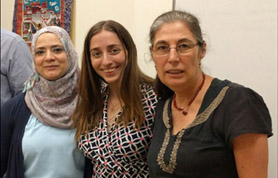Israeli and Palestinian Researchers Cooperate to Find Risk Factors for B Cell Non-Hodgkin Lymphoma
Non-Hodgkin lymphomas (NHL), tumors which may originate from B or T lymphocytes, account for approximately 3% of the worldwide cancer burden. Most epidemiological studies of NHL have been carried out in North American and European populations, with a few focusing on East Asian populations. Very few epidemiological studies have been conducted on B-cell non-Hodgkin lymphoma (B-NHL) in Middle Eastern populations. Since Israelis and Palestinians represent genetically and culturally diverse populations living in geographic proximity, research analyzing their risk factors can enrich our understanding of genes and environment in the causation of lymphoma. Despite sharing the same ecosystem, the populations differ in terms of lifestyle, health behaviors and medical systems. Yet both populations report high incidences of NHL, which represents the fifth most common malignancy in Israel and the eighth most common malignancy among West Bank Palestinians. (As of 2012, Israel also ranked first in the world in NHL incidence rates.) Now, Israeli and Palestinian researchers have conducted a large-scale epidemiological study examining risk factors for B-NHL and its subtypes in these two populations. The team was led by Prof. Ora Paltiel, Director of the Hebrew University-Hadassah Braun School of Public Health and Community Medicine, in the Hebrew University's Faculty of Medicine, and a Senior Physician in Hadassah's Hematology Department.Recruiting from both the Palestinian Arab and Israeli Jewish populations, the researchers looked at medical history, environmental and lifestyle factors among 823 people with B-cell non-Hodgkin lymphoma (B-NHL) and 808 healthy controls. Using data from questionnaires, pathology review, serology and genotyping, they uncovered some risk factors common to both populations and other factors unique to each population.The data, reported in the peer-reviewed journal PLOS ONE, showed that in both populations, overall B-NHL was associated with recreational sun exposure, black hair-dye use, a history of hospitalization for infection, and having a first-degree relative with a blood cancer. An inverse association was noted with alcohol use. Some exposures, including smoking and greater-than-monthly indoor pesticide use, were associated with specific subtypes of B-NHL.The data also pointed to differences between the populations. Among Palestinian Arabs only, risk factors included gardening and a history of herpes, mononucleosis, rubella, or blood transfusion, while these factors were not identified in the Israeli Jewish population. In contrast, risk factors that applied to Israeli Jews only included growing fruits and vegetables, and self-reported autoimmune diseases.The researchers concluded that differences in the observed risk factors by ethnicity could reflect differences in lifestyle, medical systems, and reporting patterns, while variations by lymphoma subtypes infer specific causal factors for different types of the disease. These findings require further investigation as to their mechanisms. The fact that risk factors operate differently in different ethnic groups raises the possibility of gene-environment interactions, that is, that environmental exposures act differently in individuals of different genetic backgrounds. However, this divergence may reflect differences in diet, cultural habits, socioeconomic, environmental and housing conditions, medical services, exposure to infections in early life or other factors. This study reflects a unique joint scientific effort involving Israeli and Palestinian investigators, and demonstrates the importance of cooperative research even in politically uncertain climates. Cancer epidemiology will be enriched through the broadening of analytic research to include under-studied populations from a variety of ethnicities and geographic regions.Participating institutions in this research included: Braun School of Public Health and Community Medicine, and Depts. of Hematology and Pathology, Hadassah-Hebrew University Medical Center; Dept. of Medical Laboratory Sciences and Dept. of Community Medicine, Faculty of Medicine, Al Quds University; Cancer Care Center, Augusta Victoria Hospital; Beit Jalla Hospital; Department of Statistics, Hebrew University; Department of Primary Health Care, Palestinian Ministry of Health; Tisch Cancer Institute and Institute for Translational Epidemiology, Mount Sinai School of Medicine; Rambam Medical Center and Rappaport Faculty of Medicine, Technion; Chaim Sheba Medical Center and Meir Medical Center and Tel Aviv University.To view the full article atPLOS ONE


